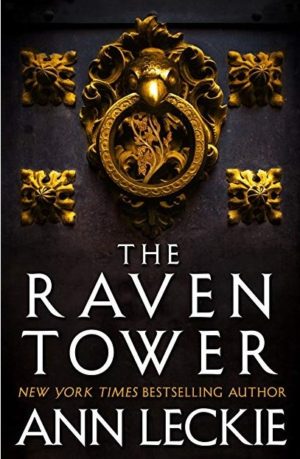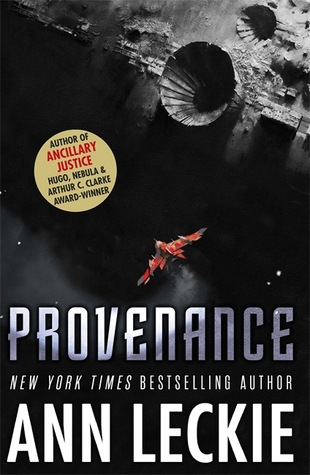Book Review: THE RAVEN TOWER by Ann Leckie

Ann Leckie is best known for her space opera work in The Ancillary series, a series that uses a first person point of view, pronouns, scope, and perspective to give a fresh and literary spin on that subgenre. I’ve highly enjoyed Leckie’s work in this arena and was excited to discover that she has an interest in writing fantasy as well. In her new novel, The Raven Tower, a second person point of view and experimentation with narrative and protagonists support an interesting turn for the author into fantasy novels. In a world very similar to our own — save that there are Gods — conflicts between city states and other polities run very much like they did in our Earth during the bronze age. Rulers strive for temporal supremacy over important resources and locations alike. Having the favor of a God or two is the “killer app” of warfare and conflict on this world, but when both sides have powerful Gods on their sides, conflicts become more subtle, more complex, and longer lasting. A key strait and a pair of cities on either side provide a venue for men and Gods to war against each other. And the Strength and the Patience of the Hill, a humble God from the far north, watches and patiently waits, even as They (for that is the God’s preferred pronoun) are inevitably drawn into the conflict. It is the God’s story, as refracted into the human protagonist Eolo who provides much of that action that is the heart of Ann Leckie’s story in The Raven Tower.
360. Ann Leckie (a.k.a. Singularitrix) — The Raven Tower (An Interview)

https://media.blubrry.com/skiffyandfanty/dts.podtrac.com/redirect.mp3/archive.org/download/SandFEpisode360AnnLeckieTheRavenTower/SandF–Episode360–Ann_Leckie_TheRavenTower.mp3Podcast: Play in new window | DownloadSubscribe: Apple Podcasts | Spotify | Android | iHeartRadio | Podchaser | Podcast Index | Email | TuneIn | Deezer | RSSShakespeare, geology, and sacrifices, oh my! In today’s interview, Jen and Paul are joined by Ann Leckie, award winning author of the Ancillary Series, to talk about her debut fantasy novel, The Raven Tower. They start with what books inspired the plot and unique characters of the novel, move into the narrative techniques Ann used and how those allowed her to… perhaps withhold some information from the reader, why she enjoys language and the ways that it has power, transgender representation, the female characters of Hamlet and, as usual, much, much more! We hope you enjoy the episode!
337. Ann Leckie (a.k.a. Singularitrix) — Provenance (An Interview)

http://media.blubrry.com/skiffyandfanty/dts.podtrac.com/redirect.mp3/archive.org/download/SandFEpisode337InterviewWithAnnLeckie/Sandf–Episode337–InterviewWithAnnLeckie.mp3Podcast: Play in new window | DownloadSubscribe: Apple Podcasts | Spotify | Android | iHeartRadio | Podchaser | Podcast Index | Email | TuneIn | Deezer | RSSSpace Opera, heritage, and alien ambassadors, oh my! Shaun is joined by guest host Feliza Casano of Girlsincapes.com to interview Ann Leckie about the stand-alone novel in her Radch universe, Provenance. Ann shares some of her Space Opera influences, talks about how her love of archeology led her to an exploration of the role museums play in the myth of heritage, the nature of identity, naming, language, and so very much more. Don’t miss this one everyone! We hope you enjoy the episode! Note: If you have iTunes and like this show, please give us a review on our iTunes page, or feel free to email us with your thoughts about the show! Here’s the episode (show notes are below):
Book Review: Ancillary Justice by Ann Leckie

Revenge and Retribution are hard things. Especially if you were once the A.I. of a spacecraft, helping to run a planet conquered by the Empire, and having dozens of bodies at your command (as well as the ship itself), and now you are stuck in one, fragile, human body. You aren’t in the revenge and retribution business for purely personal reasons–that would be easy. No, there are big problems in the Radch Empire, and not enough people know about them to take action. Of course, the fact that you are going up against the seemingly immortal ruler of the Empire is one of those big problems to deal with. Ancillary Justice is a debut novel from Ann Leckie. The author’s skill and experience in the short fiction world (including a strong early story in her career, and a favorite of mine, “Hesperia and Glory”) serve her well here in her first novel. Breq makes for an interesting protagonist. The novel’s split in its time frame means that while we see the action from her diminished self, we also get to see her in the past, in her full powers and authority, before the event that leads to her diminishment. Although she is implacably driven, Breq is not a one note Javert by any means. It is, in fact, when she deviates from her course that we get to see her grow and develop as a character, as the challenges of being in a single body, and mortal, become all too clear. Likewise, the other characters we met, from the colonial officers in her backstory to Seviarden Vendaai, the lost scion of a minor House found on the ice planet that opens the novel, to the Lord of the Rasch herself, Anaander Mianaai, are all also well drawn and interesting. It occurs to this reviewer that twenty or even ten years ago, most of the characters in the novel would have almost certainly been male. Instead, here, and refreshingly, there are many and varied female characters winningly portrayed in positions of power, authority and agency in the author’s science fictional universe. Although some of the worldbuilding could have been clearer, the world that the author presents here is unbelievably rich, diverse, complicated and interesting. The author shows the world in the large and the small, alike, and the foci of her attention demonstrates the author’s interests well. For example, the use of language and the importance of language is an abiding concern in the novel, as tenses, genders and other language elements garner a lot of attention. The author understands that how a culture uses language and how they develop their language tells you a lot about them, and Leckie plays that card with enthusiasm. The use of religion in the novel is also equally convincingly detailed and explored. The polyglot and polytheistic Empire of the Radch is not even a monolith even so far as that, as we meet people in the Empire who treat faith and religion and their Gods in a spectrum ranging from the devout to the apathetic and points between. And then there is the technology and the culture on the macro scale. Empires are inherently interesting to me, and the dynamics and logic of empire are something the author has a good time playing with. Given the divergent time frames of the novel, we get to see the Radch at two distinct periods in their history; if anything, the author could have pushed this parallax even more than she does in the novel. The nature of colonial administration and politics, how empires expand, stagnate and suffer crisis, and their relations with other powers are all explored through the lens of Breq’s story. Likewise, the technology that the Empire wields, especially ships like The Justice of Toren, is winningly depicted. The narrative lets us see Breq in her two forms. On the one hand we see her in her glory and the full panoply of powers–simultaneously running a massive ship and controlling and experiencing the life of having multiple bodies. And, on the other hand, we see the challenges she faces of living a much more limited, single body, existence. With all this, don’t misunderstand me about the nature of the book. This is also first rate, rollicking space-opera with plenty of action, intrigue and adventure in addition to the deeper thoughts on identity, cultural worldbuilding and agency for female characters. The novel does its antecedents in the genre proud, and I was particularly reminded of Walter Jon Williams’ Dread Empire series. There are some first novel and first series niggles that I can complain about, but nothing major. There is a big story here that the author is dying to tell, and we get a lot of setup for that story. As a result, perhaps. the novel lacks a complete arc of its own. However, Justice is coming to the empire, indeed. I am extremely interested, now that the board is set and the pieces known, where the author goes from here. Its a fabulous debut.

